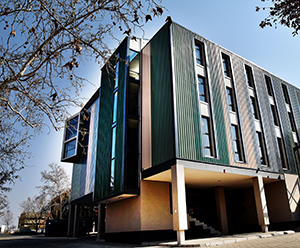Latest News Archive
Please select Category, Year, and then Month to display items
02 January 2025
|
Story Gerda-Marie van Rooyen
|
Photo Supplied
 Leading the research in South Africa is Prof Linus Franke from the Department of Soil, Crop and Climate Sciences.
Leading the research in South Africa is Prof Linus Franke from the Department of Soil, Crop and Climate Sciences.
Scientists are actively pursuing the successful breeding of diploid hybrid potatoes from inbred lines. This is expected to revolutionise potato breeding as it holds the key to rapid genetic progress. It will introduce new varieties for commercialisation through seed. Currently, existing potato variants have a gene that renders self-pollinated seeds infertile.
Prof Linus Franke, an academic in the Department of Soil, Crop and Climate Sciences at the UFS, is leading the research in South Africa. “This technology allows the production of genetically uniform potato seed that is easy to transport and largely disease-free.” He says this differs from conventional breeding whereby only vegetative propagation is possible due to tetraploid varieties in potatoes. It also risks carrying pests and diseases from one generation to the next – leading to the accumulation of pests and diseases with each round of multiplication.
Seed innovation
Prof Franke explains that Solynta BV, a seed company based in the Netherlands that produces potato varieties that can be grown from seed, has included South Africa in their research efforts because it is one of Africa’s largest producers and exporters. Through his academic relationship with Wageningen University and Research, a Dutch institution renowned for its agricultural endeavours and food production, the UFS became involved in researching hybrid potatoes grown from seed.
Diploid seeds containing two sets of chromosomes allow easier gene manipulation to increase predictability and speedier genetic progress. The breeding approach enables the incorporation of tolerance to pests, diseases, abiotic stresses (cold, heat, drought) and other desired genetic traits.
Although Prof Franke is optimistic about this research, he is not blind to disadvantages. “Potato seeds are tiny and have little energy reserves, making it harder to grow potatoes from seed than from tubers.” He says potatoes from seed will take longer to cultivate than tubers, as farmers need to grow plantlets from seeds first, adding six weeks to the growing period. “It is possible that commercial farmers can grow potatoes directly from seed. Alternatively, perhaps more likely, specialised growers will produce tubers of potatoes from seed; these tubers are then sold as seed tubers to other potato farmers, who then continue their normal practices of producing potatoes for the market from tubers.”
Financial benefits
Prof Franke says farmers have reason to get excited. “Seed potatoes will reduce input costs, as varieties with enhanced tolerance to pests and diseases require less pesticides. Planting one hectare of potatoes requires three to four tonnes of potato tubers, but only one 25 g packet of potato seeds.” Since potatoes are a more valuable commodity than maize, this technology might also increase farmers’ income potential.
Expansion to Physics building officially opened on Bloemfontein Campus
2016-05-06

The newly-opened addition to the Physics Building on the Bloemfontein Campus.
Photo: Charl Devenish
|
An extension to the Department of Physics at the University of the Free State (UFS) was officially opened on the Bloemfontein Campus on 20 April 2016.
“This started off about five years ago when we were talking about not having enough room for large classes. Prof Matie Hoffman suggested that we build a large lecture room on our parking space,” said Prof Hendrik Swart, Professor in the Department of Physics as he addressed guests at the official opening ceremony.
“A year later, we received a Sarchi Research Chair [South African Research Chairs Initiative] on Advanced and Luminescent Materials. We needed more office and laboratory space. The two ideas were combined and presented to the university’s senior management,” he added.
When the university was founded in 1904, Prof James Lyle was appointed to head up the Physics and Chemistry departments. Five years later, a single room was allocated for the Physics laboratory in the main building upon its completion. In 1947, the old Physics building was designed and constructed. Fast forward 69 years, the department has reached another milestone. Facilities accommodated by the expansion include a new telescope for astrophysics experiments, a basement for storing old equipment, as well as a sliding trap door which allows heavy goods to be elevated into the building from the ground floor. The telescope is one of the many unique features of the building given its capacity to expose graduate students to the basic techniques of radio astronomy, especially in light of the fact that the SKA (Square Kilometre Array) project which is in progress.
“Our department is extremely strong at this stage, and a bright future lies ahead,” said Prof Koos Terblans, the Head of Department. The opening also served to celebrate the 103 publications achieved by the department last year.
Dr Lis Lange, Vice-Rector: Academic is proud of the heights reached by the department to date. “The Department of Physics is undoubtedly one of the jewels in the crown of our university, and we are very proud of its developments. Universities are built on legacies, and they are also about change, which is what this department has been demonstrating.”
The expansions to the building with its top-class facilities, was constructed at a cost of R25 million – an infrastructure grant courtesy of the Department of Higher Education and Training.